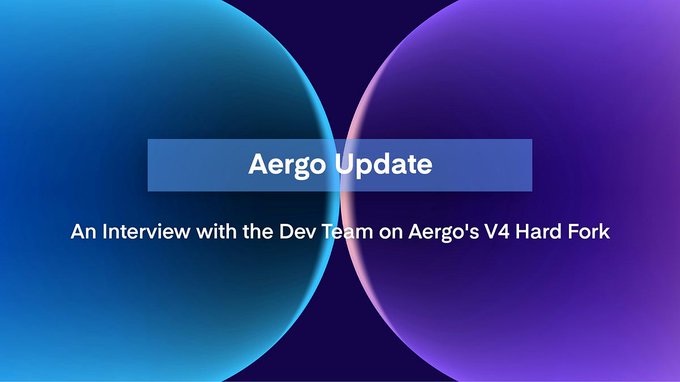https://medium.com/aergo/an-interview-with-the-dev-team-on-aergos-v4-hard-fork-d122861dfaa5
1. Background and Goals of the Hard Fork
1) What is the primary goal of the V4 hard fork?
The primary goal of this V4 hard fork is to enhance the transparency of smart contracts, enabling future integration with machine learning. This will lead to clearer and more traceable data and contracts on the blockchain, benefiting both current and future applications on the Aergo platform.
2) What is the most significant technological advancement of V4 compared to the previous versions?
The most significant technological advancement in V4 is introducing a new data model that positions Aergo for applications involving Machine Learning and integration with Small and Large Language Models. This advancement prepares Aergo for future developments in AI and blockchain integration.
2. Technical Improvements and Changes
1) What is the most crucial technical upgrade in the V4 hard fork?
The most crucial technical upgrade in the V4 hard fork is the enhancement of Aergo’s Lua engine, which is used for smart contract development. These improvements to the Lua engine will boost performance, security, and flexibility for developers building on the Aergo blockchain. This upgrade includes the introduction of internal transaction logging and composable transactions, making contracts more transparent.
2) What new features or protocols are being introduced with this hard fork, and what advantages will these provide to users, developers, and enterprise clients?
The V4 hard fork introduces several new features and protocols:
– Composable transactions: Batch transactions and executions together to reduce transaction costs and time for end users. Devs can execute several contracts within one or fewer transactions.
– Text-based contracts/transactions: All Lua contracts on Aergo will be stored as source code instead of bytecode, making them more human-readable and deterministic.
– (Upcoming)Internal transaction logging: This upcoming feature will further improve transparency by providing detailed logs for complex contracts that interact with each other, helping users track activities across interconnected contracts.
These features provide advantages such as improved transparency and usability for users, developers, and enterprise clients. They also lay the groundwork for future developments like DAOs and machine learning applications on the Aergo mainnet.
3) Are there any specific technical requirements that Aergo, focused on the enterprise environment, should prioritize compared to other projects?
Yes, Aergo emphasizes high processing speed and flexibility. For enterprise environments, the usability of smart contracts is critical in building trust and enabling more efficient use of blockchain technology.
3. Risks and Problem-Solving
1) What was the most significant technical challenge in preparing for the V4 hard fork?
The Aergo team faced several critical challenges in preparing for the V4 hard fork, primarily focusing on ensuring compatibility and a smooth transition for existing enterprise customers. Some of the key challenges include:
– Ensuring Backward Compatibility: One of the biggest challenges was to ensure that the new features and changes introduced in V4 don’t break existing functionality or negatively impact current enterprise applications. This is particularly crucial for Aergo, given its focus on enterprise clients.
– Implementing the New Data Model: Introducing a new data model to support Machine Learning and Language Model integration is a significant technological leap. Ensuring this new model works seamlessly with existing blockchain structures without compromising performance or security was a considerable challenge.
– Upgrading the Lua Engine: Enhancing the Lua engine while maintaining its efficiency and ensuring it doesn’t introduce new vulnerabilities was a complex task requiring extensive testing and optimization.
2) Is there a backup plan or rollback process in place if the hard fork is not successfully implemented?
The Aergo team has thoroughly tested various scenarios to ensure the success of the hard fork. These tests include app installation and initialization, wallet functionality, transaction processing, token operations, and more. All testing is conducted on the testnet to ensure stable performance before rolling out changes to the mainnet. Additionally, the team has implemented post-upgrade monitoring processes and prepared client-specific contingency plans.
4. Impact on the Enterprise Environment
1) What impact is this hard fork expected on enterprise clients, and what key benefits can they gain from this upgrade?
Enterprise clients can benefit from the enhanced Lua engine, which makes smart contract development more efficient and secure. New features like composable transactions and text-based contracts will also provide more flexibility in building and managing blockchain applications.
2) What concerns do enterprise clients typically have about large-scale upgrades like hard forks, and how are these concerns addressed?
Enterprise clients often worry about stability and security during large-scale upgrades. To address these concerns, Aergo ensures thorough testing and optimization to guarantee the network’s stability and security during and after the upgrade.
5. Post-V4 Roadmap
After completing the V4 hard fork, what are the following major goals? Are there any additional hard forks or upgrades planned in the long term?
With the introduction of features like text-based transactions and the groundwork for integrating machine learning and language models, we at Aergo are setting the stage for more advanced applications of blockchain technology in the enterprise space.
The future development direction of enterprise blockchain technology after this V4 hard fork is focused on increased functionality, better integration with AI and machine learning technologies, and more human-readable and interpretable blockchain interactions. These advancements align with the growing demand for more accessible and powerful blockchain solutions in the enterprise sector.
